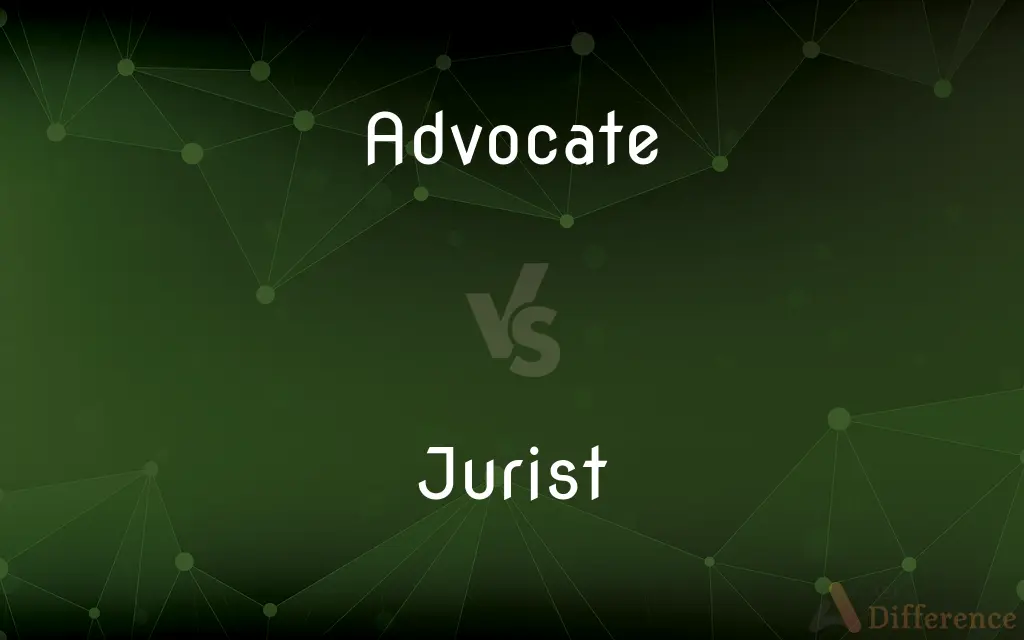Advocate vs. Jurist — What's the Difference?
By Fiza Rafique & Urooj Arif — Updated on April 29, 2024
"Advocate" refers to a person who supports or argues for a cause or policy, or a lawyer who pleads cases in court, whereas "jurist" is a legal scholar or an expert in law, often focused on theory and analysis.

Difference Between Advocate and Jurist
Table of Contents
ADVERTISEMENT
Key Differences
An "advocate" typically refers to someone who actively supports or argues for a particular cause, policy, or client's interests in a legal context. They are directly involved in the presentation and argumentation of cases. On the other hand, a "jurist" is primarily an expert in the theory and philosophy of law and may not necessarily engage in legal practices or courtroom proceedings.
In the legal profession, an advocate often plays the role of a barrister in some jurisdictions, actively representing clients in court, presenting evidence, and making legal arguments. Whereas a jurist, such as a judge or an academic specializing in law, focuses on interpreting, studying, and writing about laws, often influencing legal thought and policy without direct engagement in legal cases.
Advocates are typically found actively speaking in courtrooms or public platforms, utilizing their skills to influence decisions in favor of their clients or causes they represent. Conversely, jurists might be found in academic or judicial settings, providing interpretations or critiques of laws, shaping legal education, and drafting legal texts.
The training for advocates involves practical skills in litigation, negotiation, and legal representation. In contrast, jurists often pursue extensive academic study in law, including historical and international perspectives, which might lead to careers in teaching, researching, or judicial appointments.
The impact of an advocate is often immediate and apparent in the legal outcomes they achieve for clients or causes. Meanwhile, the influence of a jurist may be broader and longer-term, affecting legal systems and philosophies through scholarly works and judicial opinions.
ADVERTISEMENT
Comparison Chart
Definition
A lawyer who represents clients in court or a supporter of a cause
A legal scholar or expert, often involved in theoretical aspects of law
Primary Role
Legal representation and advocacy in courts
Research, analysis, and teaching of legal theories
Setting
Courtrooms, legal practices
Universities, courts as judges, legal think tanks
Training
Practical training in litigation and advocacy
Extensive academic study in law and its theories
Impact
Direct on specific cases and legal outcomes
Broader on legal systems, policies, and education
Compare with Definitions
Advocate
Lawyer.
As an advocate, she represents clients in criminal trials.
Jurist
Judge.
As a jurist, he brings a wealth of knowledge to the courtroom.
Advocate
Proponent.
He's an advocate for using technology in education.
Jurist
Legal expert.
The jurist provided insights during the legislative review.
Advocate
Supporter.
He is a strong advocate for environmental reforms.
Jurist
Legal scholar.
The jurist published a significant paper on constitutional law.
Advocate
Spokesperson.
She acted as an advocate for the company during the crisis.
Jurist
Theorist.
His work as a jurist focuses on the intersection of law and ethics.
Advocate
Defender.
She is known as an advocate for human rights.
Jurist
Academic.
She is a respected jurist and professor at the law school.
Advocate
An advocate is a professional in the field of law. Different countries' legal systems use the term with somewhat differing meanings.
Jurist
A jurist is a person with expert knowledge of law; someone who analyses and comments on law. This person is usually a specialist legal scholar—not necessarily with a formal qualification in law or a legal practitioner, although in the United States the term "jurist" may be applied to a judge.
Advocate
To speak, plead, or argue in favor of
Advocate a vegan diet.
Jurist
One who has thorough knowledge and experience of law, especially an eminent judge, lawyer, or legal scholar.
Advocate
Usage Problem To act as an advocate
Advocated for her patients.
Advocated for more stringent crime laws.
Jurist
(law) An expert of law or someone who researches jurisprudence.
Advocate
One that argues for a cause; a supporter or defender
An advocate of civil rights.
Jurist
A judge.
Advocate
One that pleads in another's behalf; an intercessor
Advocates for abused children and spouses.
Jurist
One who professes the science of law; one versed in the law, especially in the civil law, such as a judge, lawyer, or legal scholar; a writer on civil and international law.
It has ever been the method of public jurists to draw a great part of the analogies on which they form the law of nations from the principles of law which prevail in civil community.
Advocate
A lawyer.
Jurist
A legal scholar versed in civil law or the law of nations
Advocate
Someone whose job is to speak for someone's case in a court of law; a counsel.
Jurist
A public official authorized to decide questions bought before a court of justice
Advocate
Anyone who argues the case of another; an intercessor.
Advocate
A person who speaks in support of something, or someone.
Advocate
A person who supports others to make their voices heard, or ideally for them to speak up for themselves.
Since she started working with her advocate, she has become much more confident.
Advocate
(transitive) To plead in favour of; to defend by argument, before a tribunal or the public; to support, vindicate, or recommend publicly.
Advocate
(transitive) To encourage support for something.
I like trees, but I do not advocate living in them.
Advocate
To engage in advocacy.
We have been advocating for changes in immigration law.
Advocate
To appeal from an inferior court to the Court of Session.
Advocate
To call a case before itself for decision.
Advocate
One who pleads the cause of another. Specifically: One who pleads the cause of another before a tribunal or judicial court; a counselor.
Advocate
One who defends, vindicates, or espouses any cause by argument; a pleader; as, an advocate of free trade, an advocate of truth.
Advocate
Christ, considered as an intercessor.
We have an Advocate with the Father.
Advocate
To plead in favor of; to defend by argument, before a tribunal or the public; to support, vindicate, or recommend publicly.
To advocate the cause of thy client.
This is the only thing distinct and sensible, that has been advocated.
Eminent orators were engaged to advocate his cause.
Advocate
To act as advocate.
Advocate
A person who pleads for a cause or propounds an idea
Advocate
A lawyer who pleads cases in court
Advocate
Push for something;
The travel agent recommended strongly that we not travel on Thanksgiving Day
Advocate
Speak, plead, or argue in favour of;
The doctor advocated a smoking ban in the entire house
Common Curiosities
What distinguishes an advocate from a jurist in legal practice?
An advocate actively represents cases in court, while a jurist usually focuses on legal theory and analysis.
How do the educational paths for advocates and jurists differ?
Advocates usually focus on practical legal training, while jurists often pursue deeper academic study in law.
Can a jurist also be an advocate?
Yes, some jurists may also serve as advocates, but their primary focus is typically on academic and theoretical aspects of law.
What skills are essential for an advocate?
Strong argumentation, public speaking, and practical legal skills are crucial for advocates.
Is the role of a jurist limited to academia?
Not exclusively, as jurists can also be judges or hold other positions that influence legal practices and policies.
What impact does a jurist have on society?
Jurists can shape legal education, theory, and policy, potentially influencing law at a foundational level.
What is the significance of jurists in legal reforms?
Jurists play a critical role in legal reforms through their deep understanding of law and its implications.
Are all jurists involved in teaching?
Many jurists teach or conduct research, but some may also work in non-academic legal roles, such as in courts or legal consultancy.
Why might someone choose to become a jurist rather than an advocate?
Interest in legal theory, research, and influencing broader legal systems might draw someone to become a jurist.
Can advocates influence legal theory like jurists do?
While advocates can influence legal practice and policy, jurists are more focused on theoretical contributions.
Share Your Discovery

Previous Comparison
Dervish vs. Sufi
Next Comparison
Friendship vs. BondAuthor Spotlight
Written by
Fiza RafiqueFiza Rafique is a skilled content writer at AskDifference.com, where she meticulously refines and enhances written pieces. Drawing from her vast editorial expertise, Fiza ensures clarity, accuracy, and precision in every article. Passionate about language, she continually seeks to elevate the quality of content for readers worldwide.
Co-written by
Urooj ArifUrooj is a skilled content writer at Ask Difference, known for her exceptional ability to simplify complex topics into engaging and informative content. With a passion for research and a flair for clear, concise writing, she consistently delivers articles that resonate with our diverse audience.
















































